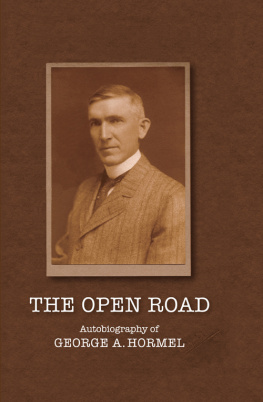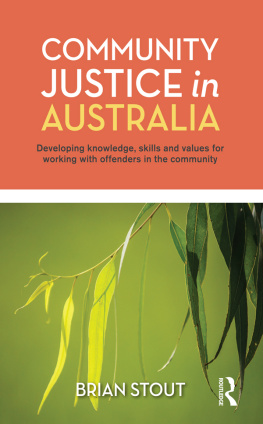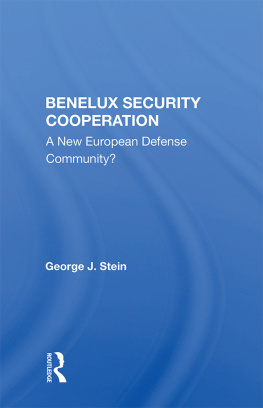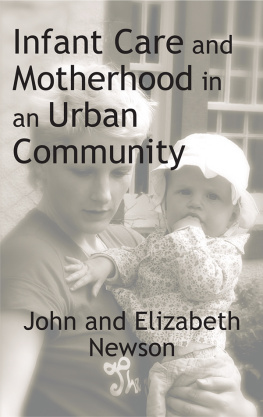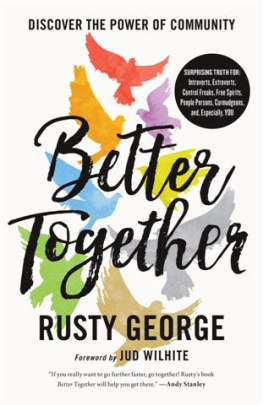George W Goetschius - Working with Community Groups
Here you can read online George W Goetschius - Working with Community Groups full text of the book (entire story) in english for free. Download pdf and epub, get meaning, cover and reviews about this ebook. year: 2015, publisher: Routledge, genre: Politics. Description of the work, (preface) as well as reviews are available. Best literature library LitArk.com created for fans of good reading and offers a wide selection of genres:
Romance novel
Science fiction
Adventure
Detective
Science
History
Home and family
Prose
Art
Politics
Computer
Non-fiction
Religion
Business
Children
Humor
Choose a favorite category and find really read worthwhile books. Enjoy immersion in the world of imagination, feel the emotions of the characters or learn something new for yourself, make an fascinating discovery.

- Book:Working with Community Groups
- Author:
- Publisher:Routledge
- Genre:
- Year:2015
- Rating:5 / 5
- Favourites:Add to favourites
- Your mark:
- 100
- 1
- 2
- 3
- 4
- 5
Working with Community Groups: summary, description and annotation
We offer to read an annotation, description, summary or preface (depends on what the author of the book "Working with Community Groups" wrote himself). If you haven't found the necessary information about the book — write in the comments, we will try to find it.
Working with Community Groups — read online for free the complete book (whole text) full work
Below is the text of the book, divided by pages. System saving the place of the last page read, allows you to conveniently read the book "Working with Community Groups" online for free, without having to search again every time where you left off. Put a bookmark, and you can go to the page where you finished reading at any time.
Font size:
Interval:
Bookmark:


AND SOCIAL WORK

George W. Goetschius

Routledge
Routledge
2 Park Square, Milton Park, Abingdon, Oxon, OX14 4RN
Simultaneously published in the USA and Canada by Routledge
711 Third Avenue, New York, NY 10017
Transferred to Digital Printing 2007
A CIP catalogue record for this book is available from the British Library
ISBN 978-0-415-86381-0 (pbk)
The publisher has gone to great lengths to ensure the quality of this reprint but points out that some imperfections in the original may be apparent
| 'The Field-Work Process' in Community Development |
| THE FACTORS AFFECTING THE DEVELOPMENT OF THE SERVICE |
| THE FURTHER DEVELOPMENT OF THE SERVICE |
| EXAMPLES OF FIELD-WORK PRACTICE: PAISLEY COMMON AS A REPRESENTATIVE COMMUNITY GROUP |
| SIX TYPICAL EXAMPLES OF HELPING A GROUP |
| THE ROLE OF THE WORKER: SKILLS AND TECHNIQUES |
| THE FUNDAMENTALS OF THE FIELD-WORK PROCESS |
| CONDITIONS OF FIELD-WORK PRACTICE |
| FACTORS AFFECTING THE DEVELOPMENT OF THE GROUPS |
| DIFFICULTIES OF THE WORKER AND THE AGENCY |
| FURTHER CONSIDERATIONS AND CONCLUSIONS |
| CONTINUED WORK RELATING TO HOUSING ESTATES |
| SPECIAL FIELD-WORK ENQUIRIES IN OTHER SETTINGS |
| COMMUNITY DEVELOPMENT AS A METHOD OF SOCIAL WORK |
April 1968
Font size:
Interval:
Bookmark:
Similar books «Working with Community Groups»
Look at similar books to Working with Community Groups. We have selected literature similar in name and meaning in the hope of providing readers with more options to find new, interesting, not yet read works.
Discussion, reviews of the book Working with Community Groups and just readers' own opinions. Leave your comments, write what you think about the work, its meaning or the main characters. Specify what exactly you liked and what you didn't like, and why you think so.

